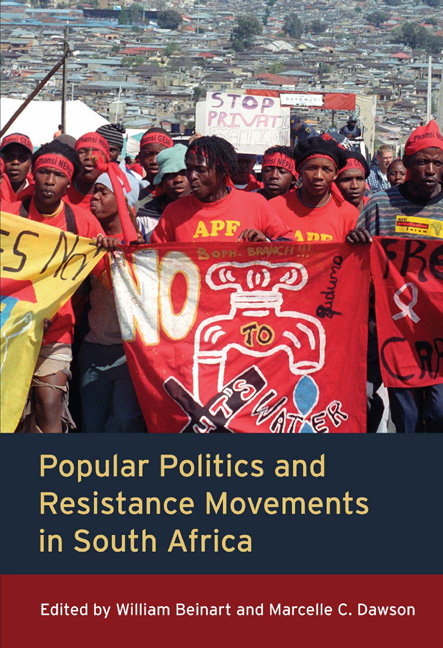Book contents
- Frontmatter
- Contents
- Contributors
- List of Abbreviations and Acronyms
- 1 Popular politics and resistance movements in South Africa, 1970–2008
- 2 The Durban strikes of 1973: Political identities and the management of protest
- 3 ‘There's more to it than slurp and burp’: The Fatti's & Moni's strike and the use of boycotts in mass resistance in Cape Town
- 4 The role of the African National Congress in popular protest during the township uprisings, 1984–1989
- 5 Strategies of struggle: The Nelson Mandela campaign
- 6 From removals to reform: Land struggles in Weenen in KwaZulu-Natal, South Africa
- 7 From popular resistance to populist politics in the Transkei
- 8 ‘It's a beautiful struggle’: Siyayinqoba/Beat it! and the HIV/AIDS treatment struggle on South African television
- 9 The Nelson Mandela Museum and the tyranny of political symbols
- 10 Black nurses’ strikes at Baragwanath Hospital, Soweto, 1948–2007
- 11 The ‘New Struggle’: Resources, networks and the formation of the Treatment Action Campaign (TAC) 1994–1998
- 12 New social movements as civil society: The case of past and present Soweto
- 13 ‘Phansi Privatisation! Phansi!’: The Anti-Privatisation Forum and ideology in social movements
- Endnotes
- Bibliography
- Index
4 - The role of the African National Congress in popular protest during the township uprisings, 1984–1989
Published online by Cambridge University Press: 21 April 2018
- Frontmatter
- Contents
- Contributors
- List of Abbreviations and Acronyms
- 1 Popular politics and resistance movements in South Africa, 1970–2008
- 2 The Durban strikes of 1973: Political identities and the management of protest
- 3 ‘There's more to it than slurp and burp’: The Fatti's & Moni's strike and the use of boycotts in mass resistance in Cape Town
- 4 The role of the African National Congress in popular protest during the township uprisings, 1984–1989
- 5 Strategies of struggle: The Nelson Mandela campaign
- 6 From removals to reform: Land struggles in Weenen in KwaZulu-Natal, South Africa
- 7 From popular resistance to populist politics in the Transkei
- 8 ‘It's a beautiful struggle’: Siyayinqoba/Beat it! and the HIV/AIDS treatment struggle on South African television
- 9 The Nelson Mandela Museum and the tyranny of political symbols
- 10 Black nurses’ strikes at Baragwanath Hospital, Soweto, 1948–2007
- 11 The ‘New Struggle’: Resources, networks and the formation of the Treatment Action Campaign (TAC) 1994–1998
- 12 New social movements as civil society: The case of past and present Soweto
- 13 ‘Phansi Privatisation! Phansi!’: The Anti-Privatisation Forum and ideology in social movements
- Endnotes
- Bibliography
- Index
Summary
Introduction
Mass protest against the apartheid system reached unprecedented levels during the 1980s as acts of resistance ranging from school and rent boycotts to strikes and open violence became commonplace. From September 1984 the scale of protest escalated when insurrection commenced in the townships. The South African government maintained that the crisis was largely of foreign provenance, and particularly that the banned liberation movement, the African National Congress (ANC), was responsible for orchestrating events from beyond the country's borders. Although unsustainable, this contention nevertheless does raise the question of the precise extent of the ANC's contribution to the progress of internal events. The issue of the reciprocal influence between internal popular protest and the external liberation movement forms the subject of this chapter (see also Klein's chapter in this volume). I focus on the period between September 1984 and September 1989, which corresponds with the tenure of the last South African parliament to sit before the commencement of formal negotiations between the National Party (NP) government and the ANC. The chapter therefore encompasses a period in which popular protest rose and was beaten back, only for it to re-emerge stronger than before, contributing to the state seeking a negotiated settlement.
The Vaal uprising
Throughout 1984 school boycotts and protests against high rents were endemic within South Africa's black townships. In many areas an underground war waged by township youths against local authorities had been in progress since council elections in November and December 1983. On 3 September 1984 riots in Sharpeville, Sebokeng and Evaton, three townships in the Vaal Triangle to the south of Johannesburg, heralded the onset of the most sustained mass urban revolt in South African history.
At the time, the ANC was reeling from the Nkomati Accord, a non-aggression pact signed by the South African and Mozambican governments in March 1984 that committed both countries to cease support for organisations engaged in armed struggle against the other. This affected the ANC's military wing, Umkhonto we Sizwe (MK), because the route from Mozambique via Swaziland had hitherto been the movement's principal means of infiltrating its guerrillas into South Africa. After Nkomati, Mozambican government leaders planned to expel MK cadres in their territory to Tanzania, a country that had no common border with South Africa.
- Type
- Chapter
- Information
- Publisher: Wits University PressPrint publication year: 2010



